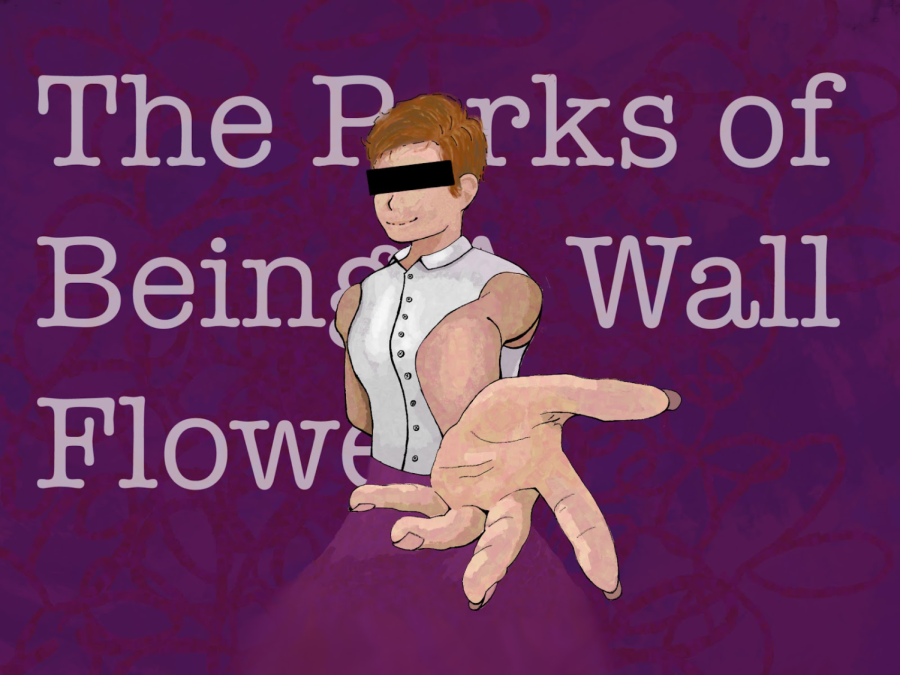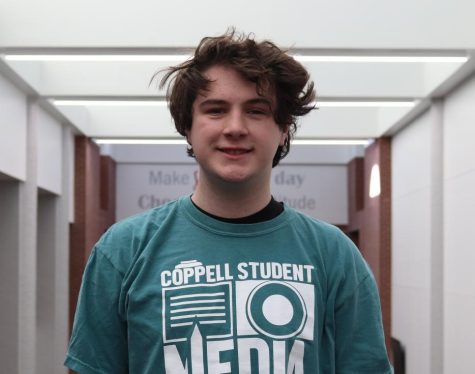The Perks Of Being A Wallflower is an accurate high school movie
In the movie “The Perks of Being a WallFlower”, we see protagonist Charlie spend his life glued to the wall, until he meets two students who help guide him through high school. The Sidekick staff writer Ainsley Dwyer discusses that even as the movie came out 10 years ago, the discussions of mental health it holds are just as relevant as ever. Graphic by Trey Boudreaux.
November 2, 2022
After the first few months of school, things start feeling real. Pressure starts building and assignments start piling up. It is hard to describe the overwhelming feeling except to a peer, and even then, the emotion can be difficult to process.
When looking for entertainment opportunities, most students would prefer to watch something that’s relatable. The Perks Of Being A Wallflower (2012) is a useful movie for students feeling this pressure because it sheds light on topics like depression, anxiety, and PTSD that are prevalent amongst teens today.
The Perks Of Being A Wallflower is a movie beloved by many high school students for being representative and relatable. The movie does a fine job at showing depression, PTSD, coming to terms with sexuality and how scary it can feel knowing you are growing up. Many films and TV shows only discuss mental health for a short time, not realizing that mental health is something a person can deal with 24/7. If you need a movie to develop an understanding about mental health and how much it can dominate a person’s life, The Perks Of Being A Wallflower is the one for you.
The Perks Of Being A Wallflower is a movie with remarkable directing, a great script and talented acting that creates authentic representations of teenagers. It is a classic movie that is important for teens to watch to understand how much weight depression can have on a person and how difficult it is to ask for help.
In the beginning of ninth grade, I struggled with mental health. When I tried talking about it to someone, I could never find the correct way to explain because frankly, you really can’t. Mental illness is different for everyone and there is no correct way to describe it. The only way I learned to describe how I felt was through this movie. It is important to showcase topics not very many people are brave enough to talk about because it gives people with mental illness a voice.
“People have different ideas of what mental illnesses can look like, and if they had more than just a couple movies to watch, they could understand it and connect with it,” Coppell High School sophomore Nishi Patel said.
Though the movie came out 10 years ago and takes place 30 years ago, teenagers’ continued love of the film illustrates how even after all this time, mental health is still a struggle.
The main character, Charlie, is a 15-year-old freshman suffering from depression after the loss of his best friend, Michael, and his Aunt Helen. He becomes friends with Patrick and Sam, two seniors, and begins to feel like he belongs. Going through ups and downs with his friends throughout the school year, however, he repeatedly spirals back into depression.
“The part where Charlie says something like ‘it comes in waves, there are highs and lows’ felt very accurate with my experience dealing with mental health,” CHS sophomore Komal Koranne said.
In the movie, Charlie first befriends his English teacher, Mr. Anderson. Charlie starts to take an interest in writing and sees Anderson as a role model. Teachers need to care for their students so that they trust them and want to learn from them.
“Your students have to know that you care about them as human beings before they’re going to care about anything you say about your content area,” CHS head theater director Lisa Stucker said.
The most iconic scene occurs after the homecoming dance, when the characters are driving. While going through a tunnel, Sam hears the song “Heroes” by David Bowie on the radio and tells Patrick to turn it up as she moves out the window to the bed of the truck. She stands up as the speed increases and just begins to live in the moment: a kind of symbolic rebirth into freedom and no longer being held back by fear.
Charlie soon begins to date another girl in the friend group, Mary Elizabeth, even though he has feelings for Sam. After accidentally exposing those feelings and humiliating Mary Elizabeth, Charlie is temporarily kicked out of the friend group. At that moment, his depression gets worse and he doesn’t know how to deal with it. However, after defending Patrick during a fight, he begins to slowly rejoin the group. Even though he is feeling more included, his depression still continually gets worse.
Towards the end of the school year, Sam and Patrick begin to talk about colleges more. Charlie begins to realize that his friends are leaving and doesn’t know how to cope. As seniors are dealing with their ascent into adulthood and beginning to apply to colleges, it’s tough to realize that your childhood is almost over. Some parents talk about how fun their high school career was, but it’s almost over for seniors. The truth that you are leaving your high school friends and whole life behind can be overwhelming.
Charlie hits rock bottom after Sam and Patrick leave for school. He arrives at his empty house where he is alone with his thoughts. He begins to contemplate suicide and calls his sister, Candace, to say his aunt’s death was his fault. His sister is at a party, so one of her friends calls the police and sends them to their house. Luckily, the police arrive in time.
He wakes up in the hospital with no memory of what happened. There, a psychiatrist brings out his repressed memories and realizes he was sexually abused as a child by his aunt. Though Charlie’s trauma had not been brought up much before this scene, the hospital scene exposed it to the light.
The night Charlie is released from the hospital, Patrick and Sam visit him. They go back to the tunnel and this time, Charlie is the one standing up in the back. He begins to cry once he realizes how free he feels in that moment, ending the movie with a memorable quote: “And in this moment, I swear, we are infinite.”
The meaning of the term “wallflower” changes throughout the movie. In the beginning, Charlie calls himself a wallflower because he has no friends. At the dance, he is a wallflower, standing off to the side and watching everyone. Towards the end, he realizes that there is a difference between being a wallflower and a doormat. He learns that they are perks to being a wallflower but you can’t not think about yourself. You have to love yourself to love others.
To say this movie is good is an understatement. There definitely needs to be more media discussing heavy topics because not talking about them does not eliminate their existence. People need to have something they can relate to and have a connection with. There are times when people feel held back or scared about getting older, but with the right support, you don’t have to feel that way.
Follow @CHSCampusNews on Twitter











